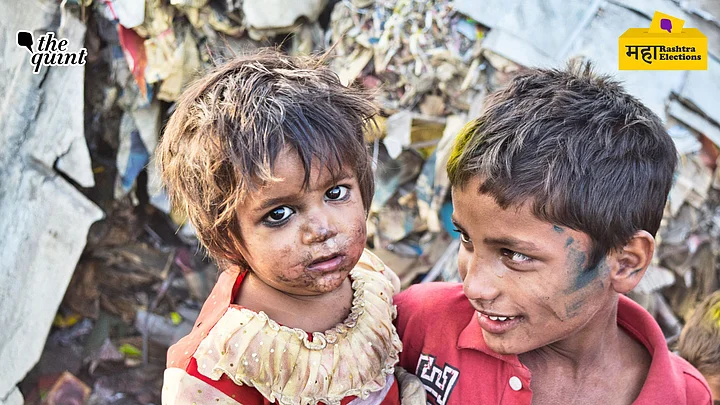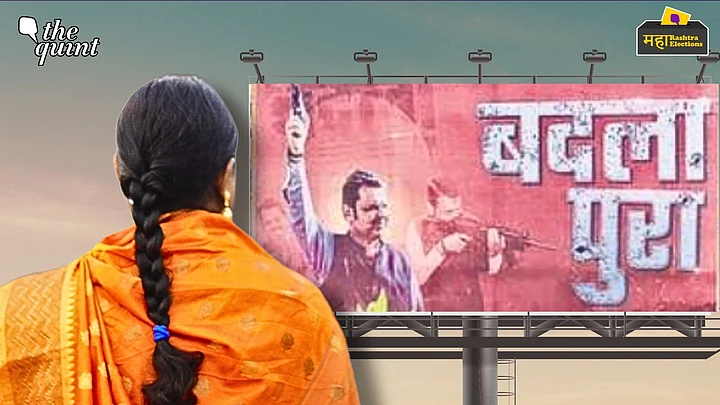Video Editor: Prajjwal Kumar
"My father hung himself. There were lots of people whose money had to be paid back," said 13-year-old Gopikar, as he sat in the play area of Snehawan, an ashram-cum orphanage in Khed taluka of Pune.
Son of a farmer from Marathwada, his father succumbed to the pressure of farm loans when Gopikar was five.
For the past three years, Gopikar has been living at the facility away from his widowed mother, while she works as a daily wage labourer on farms back in the village.
The trajectory of thousands of children is similar to Gopikar's across Vidarbha and Marathwada regions of Maharashtra, the two regions from where over 90% of the state's farmers' suicides are reported.

Children of farmers who died by suicide in Snahavan, Khed taluka, Maharashtra. Most children living here from from Marathwada region of Maharashtra.
(Photo: The Quint)
In 2023, 2,851 farmers died by suicide in Maharashtra, the kind of data that has become just another headline over the years. But beyond the data, each farmer's sucides plunges at least three more lives into more socio-economic hardships.
An official figure of 2,851 suicides, means approximately 5,000 children have been rendered fatherless in just 2023. Most of these children are plunged into more poverty, plucked out of the education system, and consequentially pushed into child labour every year, with their widowed mothers facing more financial and social hardships than before.
With the Assembly elections in Maharashtra slated to happen soon, every party is talking about farmers' crisis in the state, but barely. But beyond the statistics and data of farmers' suicides, what happens to their children?
Suicide Ends the Farmer' Life, Begins a Viscious Cycle for His Hicldren
"When a farmer ends his life, he thinks that the problems will be solved. But the problems only rise," said Ashok Deshmane, an activist and social worker who founded Snehavan. Most children here are from the Marathwada region.
"Child labour, child marriages — all such problems stem from that one suicide" he said.
The cycle of ostracism begins with the wife. Most widows of farm suicides across Marathwada and Vidarbha have been blamed, mentally and physically abused, and at times, harassed by their own family members.
Many women are offered money to leave the child with the in-laws and leave the family alone, specifically if it is a boy.

Geeta Narwade (30) faced ostracism from her own family when her husband died by suicide.
(Photo: The Quint)
"My husband died by suicide. He was a farmer. The loan amount was too high," said Geeta Narwade (30). Geeta was married off when she was 16. Fourteen years since, she has two sons aged 12 and 11. A daughter of farm labourers herself, she hails from Hingoli in Marathwada region.
"If there were 10-20 thousand rupees that came as an income in the house, I would suggest to keep some money aside for my children's future. But my father-in-law would say things like 'how do we pay for their present if we save for the future'. Eventually, they separated me from the rest of the family.
There are certain norms in place under which widows of farm suicides are entitled to financial support from the in-laws and inheritance of the piece of land legally in her deceased husband's name. But in most cases, that support dries up in repaying the loans that farmer has left behind.
"The loan was about 4-5 lakhs. To pay that off, they sold that part of the land I was supposed to inherit after my husband's death. I lost my husband and the land. I did not have any alternative to educate my children," Geeta said.
Most of these women then have to resort to farm labour. The standard rate for a day's work in a farm in Vidarbha and Marathwada regions is between Rs 100 -Rs 250. So, even if the woman works all days a month, the total income is between Rs 3,000-Rs 7000. With a monthly income that meagre, and almost no support from families, most women find it impossible to continue their children's education.

"These children are forced into child labour. In cities it is called child labour but in villages, a 12-15 year-old-boy has to take up jobs like rearing to animals, working in farms, etc. They cannot afford to sit at home. When that financial stress falls upon the family, the education is not given priority," Deshmane said.
"They take up jobs like collecting cow dung or work in hotels, or do farm labour work. Many have addictions, they start drinking etc. Then, they are married young. Some boys are married off between 16-18 years of age. Some girls are married off when they are 14-15. And then they become parents at an early age. This is a cycle," he explained.
The Psychological Trauma
In most cases when a suicide takes place, the child is usually kept unaware of the exact reason behind their father's death, till they achieve a certain age.
For those who know, the most common response is: "Aushadh ghetla." Aushadh (medicine) is a term usually used in Marathwada and Vidarbha regions for poison.
"He used to drink a lot so he was taken to a hospital," a 10-year-old said.
"My father had a surgery. That did not go well and he passed away," said another 11-year-old boy.

Most young children are usually kept unaware of the exact reason behind their father's death, till they achieve a certain age.
(Photo: The Quint)
"If the child is too young, it can be a huge stroke for it. There was a child whose father died after he drank the pesticide used for farming. A 14–15-year-old child understands that his father has died before them, and no system, money, or hospital could save him. It has a completely negative impact on their minds. The father is out of their life, but not out of their minds," Deshmane said.
Most children may not completely understand why their father took the extreme step. But what every child in Marathwada and Vidarbha is fully aware of is the socio-economic cycle behind farm suicides.
"Lots of suicides happen in Parbhani, Marathwada. Since there is no water, there is no produce. And when there's no produce, the loans pile up. When they cannot repay them, they hang themselves," said Gaurav Ubale (15), who hails from Ahmednagar. His father died by suicide two years ago.
The Cycle Behind the Cycle
About 66% of the state was reeling under drought in 2023. In May this year, the figure went up to 73%.
In the past five years, over 8,000 farmers have died by suicide in Maharashtra, out of which 52% were from Marathwada, and 39% were from Vidarbha region.
Years and years of drought mitigation policies and farm loan waivers by every government have failed to break this cycle. In the 2024 Lok Sabha elections, the National Democratic Alliance (NDA) and the Bharatiya Janata Party (BJP) faced a wipeout in Marathwada and Vidarbha due to the intensity of the drought that led amplified demands for MSP for cotton and soyabean, two primary crops grown in these regions.

But no amount of policies or farm loan waivers have changed the ground reality of the children orphaned due to farm suicides every year.
"There has to be a different database for this. The way there are grants for disabled children, the way there are separate facilities for them, there should be a different database and facilities for genuine orphans of farm suicides irrespective of any caste, class, or religion," Deshmane said.
Deshmane's establishment currently houses about 80 children aged 3-16 years. The children's education is being funded by Deshmane and the donations that he receives.

Ashok Deshmane, an activist and social worker who founded Snehavan.
(Photo: The Quint)
"Just feeding them and giving them roofs was not my motive. They need good education, schools, facilities, and good upbringing. I was a software engineer. I quit my job. I thought my education should come to their use," Deshmane said.
Looking to help the children break away from lives of despair, scores of establishments like these are looking to pull out as many children as they can from the cycle of Maharashtra's agricultural crisis.
"When plants, flowers, and children are nurtured well, and when they get a conducive environment, they flourish. The other sorrows get healed with time, for both the mother and their children," Deshmane said.
(At The Quint, we question everything. Play an active role in shaping our journalism by becoming a member today.)


